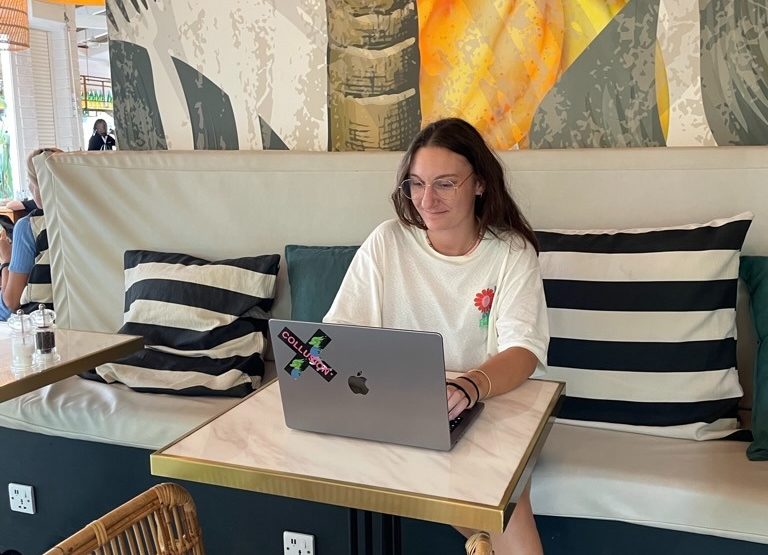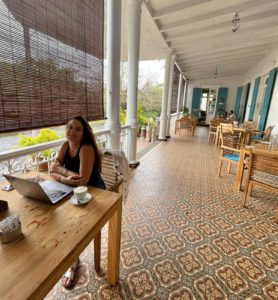
To begin, can you introduce yourself in a few words and explain to us how the teleworking experience began for you?
Hello, my name is Lucie and I am 26 years old. I have been traveling since 2019 and since 2021 I have been teleworking. I am currently in Mauritius, in Pointe d'Esny working remotely. I am a full remote employee in a French startup called Mark Copy.
I discovered Mauritius in 2019. In 2020, following confinement I was forced to telework. I started with partial teleworking in a Mauritian company at the end of 2020, beginning of 2021. I then returned to France to set up my freelance business and from there, I started full remote. I was then employed at Markcopy and have since been a 100 % teleworking employee.
I applied for Visa Premium about 8 months ago and got it very quickly. This visa is renewable several times although I think it is more judicious to apply for citizenship after 10 years of renewal.
If like Lucie you are an employee with the desire to travel in teleworking abroad, our partner Holiworking is able to support you.
Have you ever experienced traditional work associated with a physical office with colleagues?
I did my last year of my master's degree on a work-study basis in an office. When I left for Mauritius, I was also in an office for 6 months, face-to-face. I had to go to the office every day. But then I started fully teleworking. So on average three quarters of the basic time of my professional experience, until now, it has been teleworking. I have vague memories of this office period. I'm really into teleworking at the moment.
Does the company you are currently in have offices?
No, it was clearly indicated on the job description that I was going to be teleworking at 100 %. We don't have offices at all and all work remotely.
There is no office per se in France. The founders still spent a few months at Station F in Paris at the very beginning, but it was really very little. The idea for the model came because one of the co-founders wanted to go to Taiwan to join his girlfriend, for the record. So, that's how they said they might as well make a fully remote club since we're never going to see each other anyway. So in fact, the idea of full remote originally came like that.
I saw my bosses for the first time two months after I was hired. I had never seen them before. This showed me that my managers had complete confidence in me. I received a computer at my home even though they had never seen me. Giving away equipment, and placing so much trust in your employee, is pretty crazy.
How did you come up with the idea of working remotely?
When I started my freelance business, there was no point in having an office and especially no budget for it. So I stayed cloistered in my room at my parents' house for a few months. And that's when I realized that I was made for teleworking. For me, having an office can be useful for seeing people every day. But for me, on a daily basis, it doesn't necessarily bring me much. I'd rather be in a place where I know I can live my life. Because my priority is more to know where I am going to be in relation to my life rather than where I am going to be according to my company and my colleagues.
After my freelance experience, I got a taste for it. I saw that I was very productive. I also saw the disadvantages especially at the beginning. But now I see the positive, the time saving we can have.
How did you come up with the idea of going to Mauritius? Love at first sight while traveling?
It's a bit like that actually. I arrived in Mauritius after my studies in 2019, a bit by chance. I told myself that I was going to go and work for maybe six months in adventure mode. And finally, I really liked the destination and the teleworking. Covid arrived six months later. It was either I came back and the adventure abroad ended there, or I tried to stay by several means. And in the end, I stayed.
I still returned to France for a year and a half last year. Because after covid, and 2 years without going home and seeing family, it gets a little long. When I got this job at Mark Copy, I said to myself “well, now you can work anywhere in the world you can, where are you going?”. And I hesitated a lot between returning to Mauritius or going elsewhere. But it's true that I needed to return to Mauritius and see my friends again.
It had been two years since I had been back, so I left but told myself that it wasn't over. And in fact, it will never be over because now Maurice has become my base.

How do you manage the time difference in general with your colleagues or with any clients you may have?
Pretty good as we are free on our schedules. At Markcopy, we are not obliged to stay in this or that time zone. We are free to truly manage our schedule the way we want. Let's imagine that I have a client who will call me for him at 6 p.m. in the evening, it will be 8 p.m. in Mauritius. We can all adapt very easily. Our sales representative works a lot with France and a lot with French customers. He's in France, so that's not a problem.
Regarding colleagues, one of Markcopy's founders is in Taiwan or another in Bali. Since they are more in the Tech department and we are in Marketing, we don't need to have regular meetings together. Sometimes two months go by without us speaking. We use Slack a lot. This is an incredible tool when people in a company are in different time zones. From the moment we are told that we are free with our schedules, we can really arrange it however we want. So I think it becomes complicated from the moment we tell people that they can telework anywhere, but while adapting to everyone's schedule. There, it almost becomes even more complicated. So I think that there, the fact of being free and the fact that everyone manages themselves as they wish, allows everyone to adapt according to others. And to be available enough.
There are only eight of us in the team, so that also makes it easier. We are almost all alone in the department. We all do a little bit of each other's tasks.
Do you still have an hourly rate per day or do you work at the mission?
It's mostly based on what I have to do, without planning too many tasks for my day of course. Because in any business, you can always do more. So this is where it is also quite complex because we do not have a time limit per se. We have a normal 35-hour contract and I don't exceed this hourly rate, for example. But if I manage to be productive, to work 4 or 5 hours a day, I can and we really have no constraints on that at all. So it's pretty cool.
Have you ever teleworked in other destinations?
Yes, I went to Martinique for a month and a half and spent a week in Amsterdam. I have also visited France a lot. Last year, when I came back, I did a little tour of France, Brittany, and the South, while working.
It was really two intensive weeks where I moved almost every day and it was cool to go to several places. But it was also exhausting, especially when you work at the same time. There is the road but also the work to do every day. If we go there, it's also to visit and enjoy a little. So it was super intense. I think it's good to stay at least several weeks in a place, to take the time to visit, to recreate your routine. You have to think about your psychological health.
Didn't it scare you to go alone without knowing anyone?
If it's scary. But I managed to convince myself that it's all in my head. People are the same as ourselves on the other side of the world. There is no reason to be afraid. In fact, where you need to go is indicated. With your phone you do everything, you call people, you find people. It's super easy to meet new people. There are coworking spaces, coliving spaces, entrepreneur evenings almost everywhere. It's true that it's scary, but you have to think about what's next, once you're there.
Do you have any advice on how to monitor employees remotely?
There is complete trust within my company. In fact, if a person is not working, a person is not involved, it shows. Finally, it shows in the tasks she carries out on a daily basis. We all have our ways, there are some who work faster than others, there are some who are more productive than others. But a person who benefits enormously from teleworking and therefore not necessarily to work, we see it, it is felt.
And in fact, what we like about Markcopy is that the fact of feeling total trust makes us want to be involved and work for this company much more. Today, I know that I can't stand control anymore, that I hate it now. And I know that if someone were there to control that, it would upset me a lot and make me do the opposite. Afterwards I think it's a whole. In my company, we all know the turnover, we know what everyone does. We really know everything down to the smallest detail. So we are all very involved.
What qualities do you think you should have as a teleworker?
I think that when you work remotely, you have to like being alone. If a person wants to telework in a coworking every day, everyone is free. But the advantage of teleworking is precisely not going to the same office every day, it is above all having flexibility. So I think you have to enjoy your own company to really enjoy teleworking, and that's super important, you have to like being alone. You also have to be very autonomous because, if my boss isn't there with me every day, it's not because I bombard him with questions 24/7 either. You have to be outgoing, forceful of proposals or forceful of ideas. And this is also where we really have more of an employee role.
I think the two criteria would really be liking your own company, liking working alone, and being independent.

Do you think this is a solution to staying within a company and avoiding routine?
Yes, I think it's a solution because it really allows each person to manage their schedule, to do as they wish. And that’s great. I think of someone who has children and who has to take them to school at 8 a.m. when they are supposed to start work at 8 a.m., it's complicated. Flexible teleworking allows you to work at the time you want and be more productive.
When you're in an office you have the coffee machine, you have your colleagues who come to see you, you end up talking for half an hour. I'm not saying it's not good, but suddenly, when you're teleworking, there are no longer those sides. So sometimes it sucks because you find yourself alone talking to yourself. And sometimes it's cool because it's much more productive.
I remember a little when I was in an office. There wasn't a day when I wasn't bored because 7 hours is too much, 7 hours in a seated office. In fact, after 5 hours, your brain can't take it anymore. And I was experiencing it quite badly. And there, saying to yourself OK, I can work 3 hours in the morning, I go to the beach between noon and two, then I work 2 hours. If I finish, great. If I haven't finished, too bad, I'll work again tonight. Organizing like this really changes a lot of things and so I think it's better. Teleworking is a real advantage for a company.
The final word ?
 Teleworking is an enriching experience, which I really recommend. Above all, you must not do like the others. The magic thing about working from home is the freedom and flexibility. So it's not because you're teleworking that you have to say to yourself ok, I no longer have office hours because when you're teleworking, you can do what you want. If you're comfortable still working office hours, even if you're not in an office, do it. In fact, you just have to find your own balance. That, I think is really the most important part. I fell into it too. At the beginning, we want to work every evening because it's so good. I love working evenings, but actually, every evening, it's not possible. I was arriving more so I recreated a normal rhythm and now I work 9 a.m. to 5 p.m. and sometimes I work in the evening and therefore get up later the next day. You really have to do what you want. For me, that's what really enjoying teleworking is all about.
Teleworking is an enriching experience, which I really recommend. Above all, you must not do like the others. The magic thing about working from home is the freedom and flexibility. So it's not because you're teleworking that you have to say to yourself ok, I no longer have office hours because when you're teleworking, you can do what you want. If you're comfortable still working office hours, even if you're not in an office, do it. In fact, you just have to find your own balance. That, I think is really the most important part. I fell into it too. At the beginning, we want to work every evening because it's so good. I love working evenings, but actually, every evening, it's not possible. I was arriving more so I recreated a normal rhythm and now I work 9 a.m. to 5 p.m. and sometimes I work in the evening and therefore get up later the next day. You really have to do what you want. For me, that's what really enjoying teleworking is all about.